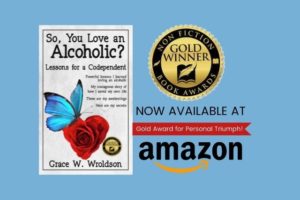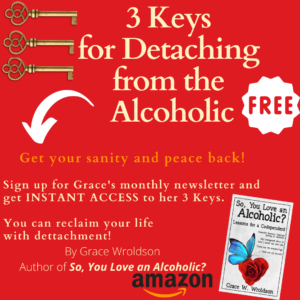Codependency
30 Signs & Symptoms
By Grace Wroldson,
author of
So, You Love an Alcoholic?:
Lessons for a Codependent
If you love an alcoholic, then you know how much energy it takes. There’s usually so much focus on the alcoholic, that often, we don’t see ourselves.
As the author of, So, You Love an Alcoholic? (book available on Amazon), I put together a list of 30 signs & symptoms of codependency that I saw in myself. You’re welcome to use this as a self-screening tool. Just know it can’t diagnose or treat the condition.*
The Basics of Codependency
As I understand, the basics of codependency are when you become so invested in the relationship that you can’t/won’t/don’t function independently anymore. It’s like an “emotional enmeshment” with ties and binds that hold you back from living a full life. It’s painful, saddening, sickening, humiliating, and oftentimes feels hopeless when someone is codependent. It’s tragic when your mood, happiness, and identity are defined by another person or the status of a romantic relationship. Because we are so much more than a romantic relationship!
If you feel like you have a relationship addiction, you might be codependent. If you are enabling an alcoholic, you might be codependent. If you are confused and suffering in a relationship, you might be codependent. If you have suffered enough, then it’s time to learn all you can! But first, we have to be self-aware. Lacking self-awareness makes us blind to what’s happening to us and with us.
Codependency Self-Screening
I am a self-diagnosed codependent. In the midst of my relationship with an alcoholic, I didn’t need a Ph.D. to see what was happening to me. It felt like a slow suicide of self and soul. Sadly, this was self-inflicted using denial and devaluing myself. Actually, I lost myself completely loving an alcoholic after 15 years of being codependent. I hit what I call a “codependent bottom.” (Read Blog: 2 Ways To Bounce Back From a Codependent Bottom) Thankfully, I was able to save myself and recover with support. You can, too! Don’t let this list get you down. Allow this list to break what I call “the codependent spell.” Think of it as an opportunity for personal growth by having awareness. This is your chance to see yourself clearly so that you can then see your choices more clearly.
If you think that you may be codependent, here are some signs and symptoms to do a type of “self-screening” assessment. These are the patterns that I recognized in myself when I looked back after fully healing from codependency and stepping into my autonomy and independence. I am so grateful to be free of these things! Just thinking about doing any of them now makes me uncomfortable. It’s amazing what being detached and healthy feels like. It’s such a difference. In the past, not doing them would have made me uncomfortable, anxious, and frantic.
30 Signs & Symptoms of Codependency
- People-pleasing others at your expense
- Needing to be part of the solution to somebody else’s problem
- Drawing your sense of self-worth and identity from the help you give others
- Caretaking adults that should be taking care of themselves (being overly-responsible)
- Having difficulty making decisions (Not knowing how you feel)
- Doing more than you are asked to do
- Valuing the approval of others more than you value your own approval
- Difficulty setting boundaries, or poor, insufficient boundary function with others
- Unable to identify what you need and want
- Feeling responsible for other people’s feelings
- Lacking trust in yourself for decisions
- Having low self-esteem
- Being extremely loyal, staying in unhealthy relationships & harmful situations for too long
- Doing things for others that they should be doing for themselves (enabling)
- Avoiding conflict and confrontations at all costs, even if you have to deny that problems exist
- Over-doing and over-giving (compulsively giving)
- Harboring feelings of resentment and being passive-aggressive (silently angry)
- Not or never speaking up
- Reacting to events around you, being triggered constantly
- Lacking a self-image without having a role to play
- Allowing dependency — not providing main things for yourself, financially and otherwise
- Feeling guilty all the time / having a guilt complex
- Feeling anxious most of the time, suffering from anxiety
- Feeling insecure, suffering from depression
- Having no self-value, not feeling important or valued but obsessing over another
- Having a deep fear of being alone and being utterly terrified of abandonment (afraid to be alone)
- Feeling bogged down and shouldering all of the relationship stress while suffering silently
- Having a hard time trusting others (past PTSD of abuse, insults, neglect)
- Having an exaggerated sense of responsibility for others (prone to fantasy and false hope)
- Severely struggling to articulate thoughts, feelings, and what’s happening (loss of coherent words, can be the result of being gaslighted for years)
3 More Identifying Markers:
31. Engaging in self-sacrifice, self-betrayal, or self-sabotage. Being a martyr.
- Intense fear of being disliked by others (afraid of other’s rejection)
- Refusing to seek help because you don’t feel like your problem is “that bad.” (Denial)
Self-Awareness to Self-Help for the Codependent
If you identified several concerning statements that apply to you, I encourage you to please get help that’s safe and right for you. You could even start with self-help and reading about codependency (book suggestions below). It’s an important first step to know ourselves and have awareness of our patterns, habits, and afflictions. It’s a strength, not a weakness, to get help. Knowledge is power and freedom is the gift we give ourselves!
My Experience With Codependency Recovery
I have changed so much with my codependency recovery. I feel like I recovered basic self-respect. Being dominated by an angry, controlling man is no longer in my future and something I won’t allow to happen again. Awareness is key to being able to detect what’s not serving us and to be able to change. I encourage you to take a brave and searching inventory of yourself so that you can address any of your weaknesses.
If you embark on a mission to save yourself from the destruction of toxic codependency, be sure to get the help of a competent, safe, caring therapist, domestic violence counselor, or codependency recovery coach if you need help facing these truths. I couldn’t face codependency alone. When I was “in it,” I lacked self-compassion and self-worth. I needed help establishing a healthy way of relating to myself. There were even a few years in my recovery when I was so angry with myself for what I had allowed to happen to me. I also needed someone to help me believe in myself because the abuser had crushed my self-esteem. We can overcome so much with the right support!
2 Things You Will Be Doing In A Codependency Recovery Program
2 primary objectives of recovery:
- Getting courageous through connection
- Getting in touch with your feelings
One of the root causes of crippling codependency is that we are cut off from our own feelings and who we are. Then, we end up being drawn to feeling responsible for other people’s feelings. In a desperate attempt to control, we even give to others out of compulsion. We end up being controlled by our own codependency. It’s ironic because all of our efforts are meant to control things around us to feel safe, yet we end up being controlled by our compulsions.
I found that courage can be gained through connecting with others who are like-minded and who have overcome similar circumstances. This is why support groups such as Al-Anon and CODA (12 Step Anonymous free programs available by phone, virtual, and in-person) are very helpful for those suffering. We hear stories and feel not so alone. We hear someone’s success and start to have hope again. We see others learning, growing, and changing, and we get inspired to do the same. With connection, we get brave and wise to our problems and learn tools and strategies that have worked.
—Grace Wroldson – mother, survivor, thriver, certified life coach, and author of 5 self-help books, which are available on Amazon
Grace loved an alcoholic for 15 years and tried everything to get him sober and save their relationship. She spent 20 years in Al-Anon and studied AA herself, hoping to help him. When loving him didn’t fix or save him, she instead had to fight to save herself and give herself a new life of sanity, peace, and freedom. With self-love, she enjoyed being single and raised a child safely outside of an alcoholic home. She regained self-respect and now helps women do the same.
3 Keys to Detaching from the Alcoholic!
Unlock your FREE PDF and INSTANT ACCESS!
Click HERE.
*Disclaimer: These tips/insights are based on the thoughts, experiences, and opinions of the author only. This is not a proper evaluation/diagnostic tool or based on any medical criteria. The author is not a mental health professional. If you need therapeutic support, please call your local clinical agencies to get a licensed professional to help you do a thorough self-assessment. The author is not liable for any injury, harm, or related problems as the result of reading her information, books, or blogs.

Like Grace’s Blog (button top of page)











